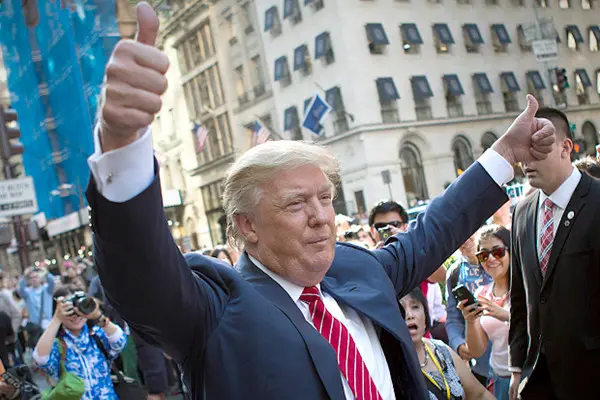It has been a provocative six months for Peter Thiel. That is the way he likes it.
Mr. Thiel, a tech billionaire, was exposed in May as a benefactor funding a lawsuit to destroy the gossip website Gawker. That sent tremors through the media world, especially when the suit proved successful. Then Mr. Thiel revealed in mid-October that he was giving money to the candidacy of Donald J. Trump, which infuriated many people in the anti-Trump hotbed of Silicon Valley.
Eight days before the presidential election, Mr. Thiel went to the National Press Club in Washington on Monday to defend his contrarian positions. He made the case for Trumpism beyond Trump, journalism without malevolence and Silicon Valley shorn of overweening hubris. It was the latest step in his unusual journey to becoming a prominent critic of politics, the media and technology, as well as a lightning rod for criticism.
Given a chance to celebrate the Republican presidential candidate in a significant setting, Mr. Thiel did not mention Mr. Trump until the eighth paragraph of his prepared text, and then he quickly denounced the candidate’s comments about women as “clearly offensive and inappropriate.”
As endorsements go, this was somewhat less than full-throated. “We’re voting for Trump because we judge the leadership of our country to have failed,” Mr. Thiel said.
He argued that both the Republican and Democratic elite in this country have for decades been inflating and promoting bubbles. “The trade bubble says everyone’s a winner; the war bubble says victory is just around the corner,” he said. “But these over-optimistic stories simply haven’t been true. And voters are tired of being lied to.”
The 13-minute speech was covered like a major Washington event in a room filled to capacity. A dozen television cameras were set up in the back with bright lights flooding the stage. A dozen photographers sat behind a red velvet rope in front of the stage. More than 100 reporters, some who had come from Silicon Valley, sat in the audience. Many held up their smartphones to take videos and photos of Mr. Thiel.
Peter Thiel speaking at the National Press Club in Washington. Photo: Getty Images
Bracing for the possibility of a confrontation with protesters, Mr. Thiel brought extra security beyond the usual number of guards who follow the billionaire during travel. Before his speech, two members of Mr. Thiel’s security detail stood at the entrance of the National Press Club building. During his speech, personal guards with matching gray suits, neatly cropped hair and ear pieces stood scanning the audience, one at each corner of the room.
The event was low key. This was not a political rally. These were journalists. Even the applause was muted. After the speech, delivered in front of a large American flag, Mr. Thiel spent about 40 minutes answering reporters’ questions that were presented by Thomas Burr, the press club president.
Silicon Valley has been incredibly successful over the last decade, said Mr. Thiel, who was the first outside investor in Facebook and a co-founder of the data-mining company Palantir. But he says he thinks that claims for the supremacy and influence of the tech world have gotten out of hand.
“The story people in Silicon Valley always want to tell is one in which their specific success, as individuals and as companies, gets conflated with the story of general success and general progress in the United States,” he said. Silicon Valley, he said, believes this: “We’re doing well, therefore our whole civilization is doing well.”
As opposed to this upbeat narrative, Mr. Thiel said, “I think the truth has been more one of specific success but more general failure.” Silicon Valley, in other words, is not doing much to improve the welfare of people who are not in Silicon Valley.
Mr. Thiel’s battle with the website Gawker began nearly a decade ago, when one of its affiliates outed him as gay at a time when his sexual orientation was not generally known. He then secretly funded the wrestler Hulk Hogan’s suit against Gawker for posting a sex tape involving Mr. Hogan, whose real name is Terry Bollea. The resulting judgment in a Florida courtroom was large enough to send Gawker into bankruptcy. Gawker.com shut down in August, and the company’s other sites were sold.
Despite his victory, Mr. Thiel was still angry. He characterized the pro-Gawker arguments this way: “If you make a sex tape of someone with their permission, you are a pornographer. If you make it without their permission, we are told now, you are a journalist.”
That, he said, “is an insult to journalists.”
As for his future, Mr. Thiel was ambivalent, or at least noncommital.
“I always have a somewhat schizophrenic view of politics,” he said. “It’s a horrible business, incredibly destructive. A lot of it is like trench warfare on the Western Front — crazy amounts of carnage and nothing ever changes.”
But, he added, “Some problems can’t be solved outside of the political arena.” So he might keep his hand in.
(THE NEW YORK TIMES)
 简体中文
简体中文





